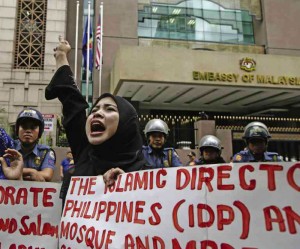Moro, militant groups rally at Malaysian Embassy, call Aquino Pilate

CRY OF PROTEST A Filipino Muslim woman is one of about 40 who rallied at the Malaysian Embassy in Makati City on Tuesday to protest air strikes and mortar attacks on nearly 200 Filipino followers of Sulu Sultan Jamalul Kiram III in Sabah. BULLIT MARQUEZ/AP
Around 40 Moro and militant groups massed in front of the Malaysian Embassy Tuesday protesting President Aquino’s actions on the Sabah standoff.
“During this Holy Week, demons come out, including Pontius Pilate—in the name of President Aquino—who keeps on blaming others and appears more like the spokesperson of the Malaysian people,” said Antonio Liongson of the Moro-Christian People’s Alliance.
“Our countrymen are already at the lion’s mouth, Aquino is pushing them to its throat; they are already at the cliff and he is still pushing them toward the edge,” he said.
Members of Katribu, Migrante and Bayan Muna, among others, expressed their disappointment at the President’s handling of the Sabah issue, calling him in placards held during the hourlong protest “a traitor” to Moros.
Yusuf Ledesma of the Coalition of Supporters for the Sultan of Sulu said Aquino did not just ignore the call of Sultan Jamalul Kiram III for help. “Instead of acting as a knowledge broker, the Aquino (administration) scolded the sultan and castigated him in public,” Ledesma said.
In a statement, Migrante said Aquino “virtually emboldened and gave license to Malaysia to instigate an attack against Filipinos in Sabah.”
“If not for the Philippine government’s passivity and inaction to protect national interest, the Sabah standoff would not have ended in bloodshed,” it said.
Crackdown feared
Migrante feared Malaysia would intensify a crackdown on undocumented Filipinos in Sabah.
In a statement on Tuesday, Harry Roque, director of the Institute of International Legal Studies at the University of the Philippines, denounced Malaysia’s bombing raids on Filipinos in Sabah.
“Under humanitarian rights law, the use of force in police operations should be strictly proportional to the threat posed by the Filipinos in Sabah,” he said.
Former Sen. Ernesto Maceda on Tuesday said that for all its tough talk, the Aquino administration still had to make a categorical statement on whether it would pursue the Philippine claim to Sabah.
Maceda, who is running for a Senate seat under the United Nationalist Alliance, said the Philippine position had remained weak, hence the violent turn of events in Sabah.
Last month, before all the bloodshed, Maceda already urged the administration to resume its active pursuit of the claim to Sabah and to consider bringing the issue to the United Nations.
“The situation is still bad because precisely, the root cause of the bad situation is the President has not taken a strong stand to support the claim of the sultan,” he said in a phone interview Tuesday.
“Malacañang has not made a categorical statement saying it is pursuing the claim of Sabah,” he added.
Back-channel talks
Lawmakers, for their part, urged the Philippine government to continue seeking a diplomatic solution to the conflict in Sabah, and to hold back-channel talks with the sultanate of Sulu.
“I think the diplomatic approach should continue to be done to ask the Malaysian government and the group of the sultan of Sulu to avoid further bloodshed and explore a fair and just solution that may be acceptable to both sides,” Maguindanao Rep. Simeon Datumanong said in a statement.
Agham Rep. Angelo Palmones said back-channel talks with the sultanate were necessary to convince it to withdraw its forces. Palmones said it was too late in the day to rely on diplomatic efforts alone.
Bayan Muna Rep. Teddy Casiño also said the President must also initiate talks between the Philippines, Malaysia and the sultanate.
Solomonic solution
Also on Tuesday, lawyer Oliver Lozano sent a letter to Justice Secretary Leila de Lima calling on her to form a commission that could formulate a “Solomonic solution” to the Sabah issue.
Lozano, who claimed to represent the Supreme Council of the Royal Sultanate of Sulu, said that he would in the meantime defer filing an impeachment case against President Aquino.—With reports from Jodee A. Agoncillo, Leila B. Salaverria and Christine O. Avendaño